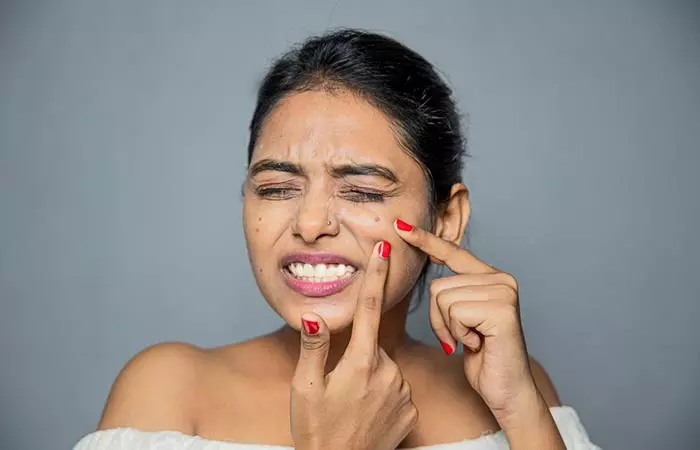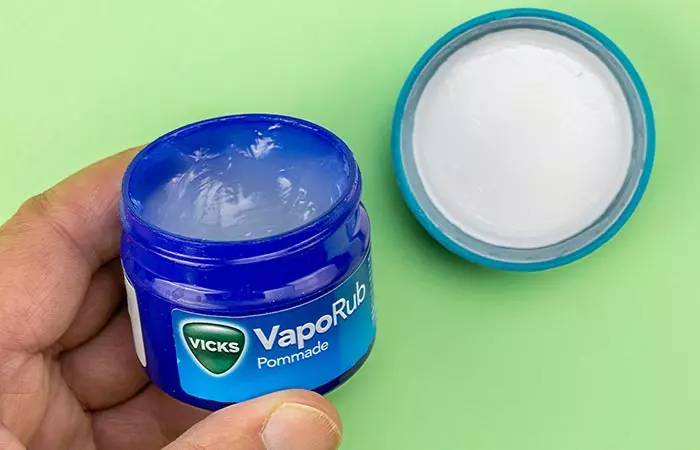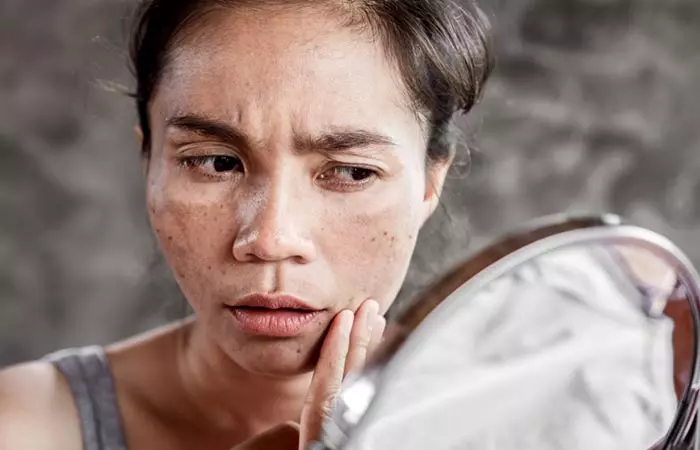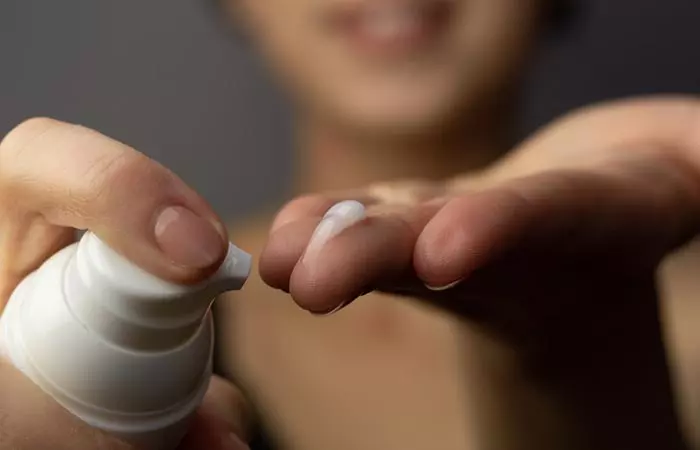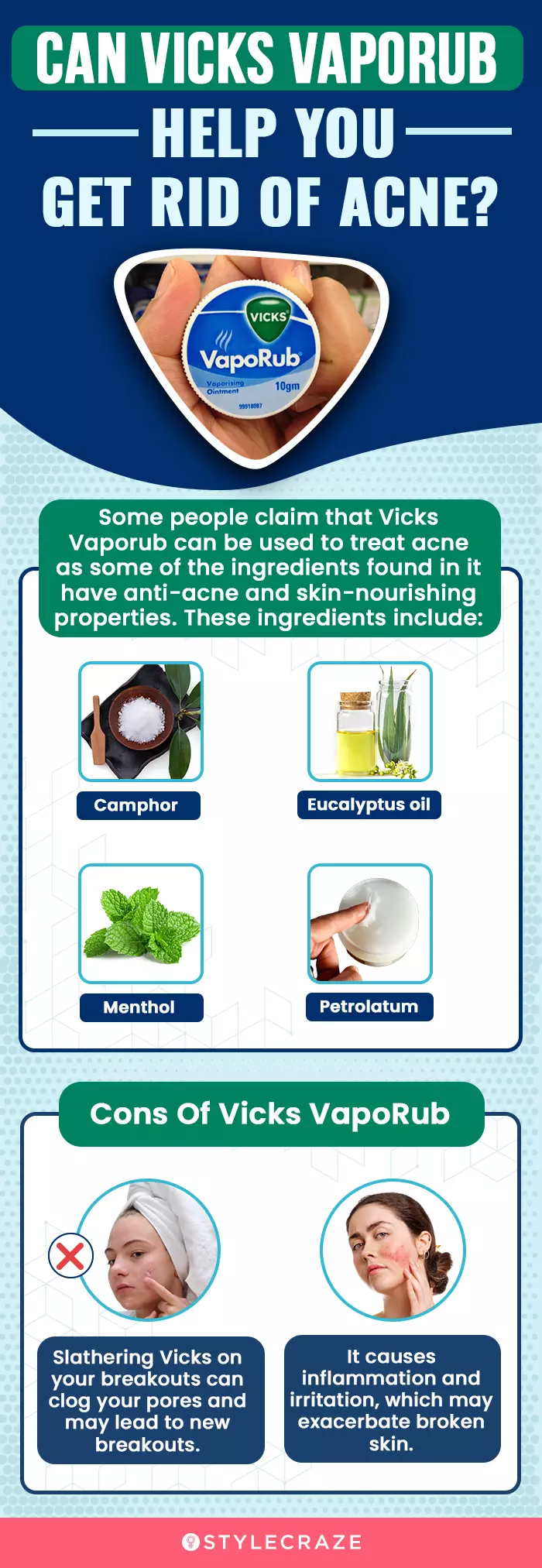VapoRub is a therapeutic ointment that is most commonly used to treat discomfort in the chest. Thanks to the essential oils and carefully selected components in it, it is a highly effective product. But it is now developing a name for itself when it comes to treating other problems, such as acne. Although Vicks has been heralded as the next at-home spot treatment for acne, does it really work? To learn more, read this article.
Does Vicks VapoRub Help Treat Acne And Spots?
Using Vicks VapoRub for acne might not be unheard of. But acne treatment is not among its primary uses. There is no scientific evidence to back any of the claims. One of the ingredients of Vicks Vaporub, eucalyptus oil, helps treat various skin issues like abscesses, fungal infections, boils, and burns (1), (2). This has made many believe the product can treat acne as well. A blogger shared how Vicks VapoRub not only improves colds and aches but also helps reduce the inflammation caused by acne. She writes, “I apply it overnight on my swollen zits or pimples, and the next day, it’s less swollen. It may seem tedious, but the less swollen and red, the less it’s noticeable (i).” However, the other ingredients in Vicks, like petroleum jelly, can have adverse effects on acne. While this has been overlooked, there are a few more ingredients in Vicks that are potentially beneficial for the skin.
Why Vicks VapoRub Is Thought To Treat Acne
People use Vicks VapoRub for its many other benefits it helps relieve chest congestion, may relieve cough and cold, and helps heal general respiratory infections (3). Proponents of Vicks as a treatment for acne suggest that applying generous amounts of the product on the face and letting it rest overnight can help reduce acne by the next morning. Others believe Vicks can be used as a substitute for regular face creams and must be applied daily in small amounts. Following are the ingredients in Vicks that could have led people to propagate its purported anti-acne effects.
Camphor: Camphor is an Ayurvedic ingredient often touted for its healing qualities in traditional Indian medicine. According to the International Journal of Science and Research, one can use camphor as an aphrodisiac, digestive aid, and to relieve sore and cramped muscles (the purpose Vicks VapoRub uses it for). While it may help treat acne when mixed with coconut or olive oils, the camphor in Vicks not meant to treat the skin condition (4).
Eucalyptus Oil: Some studies have shown that you may use eucalyptus essential oil for acne, owing to its anti-inflammatory and antibacterial properties (5). However, more research is warranted to further understand the anti-acne properties of the oil. Anecdotal evidence suggests that eucalyptus oil may also irritate the skin.
Menthol: Menthol is known for its cleansing properties. It is also helpful for treating gastrointestinal and respiratory issues and strengthening the immune system. Several studies validate the efficacy of menthol in treating various issues (6). However, no research suggests that it can help treat acne.
Petrolatum: Petrolatum, or petroleum jelly, is among the more popular home remedies for acne and other skin issues. People have successfully used it to revitalize their nails, strengthen their hair, and even take care of dry and chapped lips. While it is a convenient item to have around, the American Academy of Dermatology warns against using it for acne (7). It can clog pores and give you the illusion of glowing skin but it can eventually make your skin break out.
The Drawbacks Of Vicks VapoRub
May Clog Pores: Anyone who puts Vicks VapoRub on the face can expect clogged pores. The process is called “slugging” and involves coating Vicks on acne and the entire face. This process can leave you with clogged pores and lead to further breakouts. You would need to add a double pore cleansing practice to your regular regimen to manage it.
Could Be Dangerous For Toddlers: Rubbing Vicks on your babies’ chest or under their nostrils is not recommended. The product can cause inflammation and can also lead to long-term respiratory issues. Using Vicks is not recommended for anyone under two years of age.
May Irritate Broken Skin: Applying Vicks Vaporub on broken skin does not heal it as most think. It can instead cause irritation and inflammation.
Other Scientifically Proven Alternatives For Treating Acne
Alternatives like isotretinoin and azelaic acid may help treat acne (8). Salicyclic acid acts as a great peeling agent and offers relief from acne troubles (9). Retinol, which is a keratolytic agent, exfoliates the face by dissolving the outermost dead layers of the skin (10). It is one of the best solutions for acne. Where can I get Vicks VapoRub? Instead of using home remedies and Vicks VapoRub for acne, consult a dermatologist to understand the causes of acne and follow the prescribed treatment. You can order Vicks VapoRub online or even purchase it from your nearest drugstore. It is also reasonably priced. What are the other home remedies for acne? Honey and lemon, tea tree oil, or apple cider vinegar are often considered effective home remedies for treating acne. However, it always is better to consult a doctor to understand the right mode of usage. Is Vicks Vaporub safe for all skin types when used to treat acne? Vicks Vaporub is not recommended for use on oily skin as its viscous formula may clog your pores and increase the chances of acne. It is also not recommended for sensitive skin and may cause irritation as per anecdotal evidence. How long does it take for Vicks Vaporub to work against acne? Vicks Vaporub is not a scientifically proven treatment for acne. Hence, it is not possible to determine its efficacy as a topical anti-acne treatment. Can Vicks Vaporub be used in combination with other treatments for acne? There is no research based on the use of Vicks Vaporub as an acne treatment. Hence, it is advisable that you consult a dermatologist before combining it with other treatments for acne. How can the effectiveness of Vicks Vaporub for acne be increased? While the use of Vicks Vaporub for acne is not proven, using non-comedogenic skin care products and topical acne treatments along with Vicks may help your acne heal faster. Can Vicks Vaporub interact with other acne treatments, such as topical creams or oral medications? Vicks is less likely to interfere with oral acne medications. However, consult your doctor if you are using it along with topical acne treatments. Learn how to use Vicks Vaporub to reduce pimples, acne scars, and facial redness with this informative video. Check it out to get tips on how to apply it for the best results!
